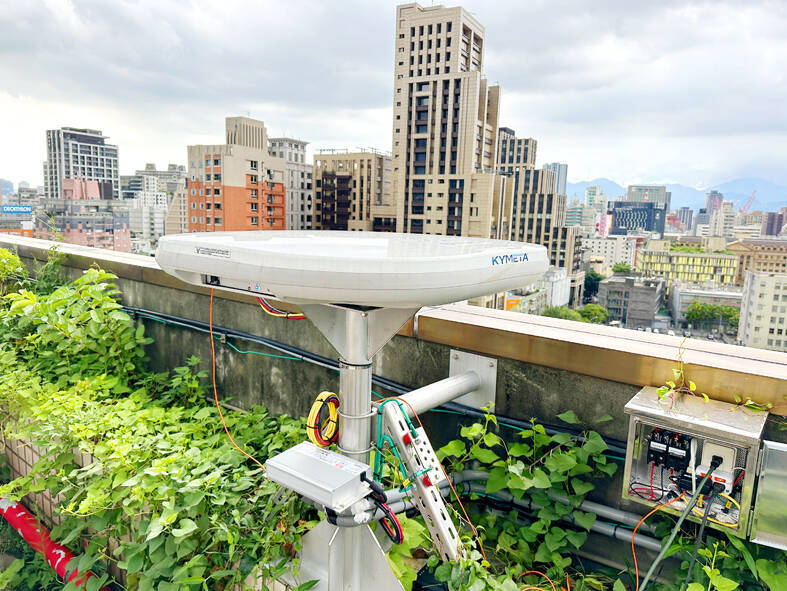The administration of US President Donald Trump should “support Taiwan’s development of strong satellite communications” in low Earth orbit, two academics wrote in an article published in Foreign Affairs on Thursday.
Daniel Byman, a professor at the Walsh School of Foreign Service at Georgetown University, and Seth Jones, a former US Department of Defense official, made the call in an article titled “How to Toughen Up Taiwan — America Must Help the Island Deal With China’s Gray Zone Tactics.”
Jones is the senior vice president and Harold Brown Chair at the Center for Strategic and International Studies. His research focuses on international security, warfare, irregular threats and terrorism, his Foreign Affairs description says.

Photo: CNA
Taiwan’s telecommunications infrastructure is vulnerable to “subversion,” the academics said.
They cited two events as examples.
In February 2023, two Chinese merchant vessels cut undersea cables connecting Taiwan proper to Lienchiang County, disrupting Internet communications, they said.
“This January, a Chinese-linked cargo vessel damaged another undersea fiber-optic cable — one of only 14 such cables linking Taiwan to the rest of the world,” they said.
Taiwan relies on European satellite operator Eutelsat OneWeb for low Earth-orbit satellite services and backup microwave communications, but the operator lacks sufficient bandwidth to be a substitute for Taiwan’s fiber-optic cables, Byman and Jones wrote.
Taiwan needs a powerful satellite service to reduce its reliance on undersea cable networks, they said, suggesting that Taiwan collaborate with Amazon.com’s Project Kuiper broadband Internet satellite constellation.
“Taiwanese leaders are already in discussions with Kuiper, but they need to move toward a deal more quickly, and Kuiper needs to increase its satellite launches in” low Earth orbit, they said.
Taiwan should work with US cloud services such as Google, Microsoft and Amazon Web Services to store backups of critical data, they said.
While it is understandable that governments prefer to buy local, important data are more vulnerable to China’s cyberattacks, espionage, physical destruction or other attacks if it is all stored by Taiwanese firms, Byman and Jones wrote.
The article also urged Taipei to issue more urgent warnings about Beijing’s aggressive actions, with the Chinese People’s Liberation Army having “engaged in a conspicuous military buildup and ramped up its cable-cutting, cyberattacks, air and naval encroachments, and military exercises, including a simulated blockade of Taiwan.”
The authors acknowledged that there might be concerns about spooking Taiwanese by stating the extent of China’s threat, but suggested that Taiwan set up a public data-driven communications platform that sends regular alerts about Chinese actions on or near Taiwan.
Such a system could help foster “public dialogue ... [and] give citizens tools to discern between actual threats and misinformation,” they said.
“Taiwan should develop a more unified strategic communications campaign across its government ministries to ensure that consistent messages about the threat level are communicated to the Taiwanese people,” they said.

The Coast Guard Administration (CGA) yesterday said it had deployed patrol vessels to expel a China Coast Guard ship and a Chinese fishing boat near Pratas Island (Dongsha Island, 東沙群島) in the South China Sea. The China Coast Guard vessel was 28 nautical miles (52km) northeast of Pratas at 6:15am on Thursday, approaching the island’s restricted waters, which extend 24 nautical miles from its shoreline, the CGA’s Dongsha-Nansha Branch said in a statement. The Tainan, a 2,000-tonne cutter, was deployed by the CGA to shadow the Chinese ship, which left the area at 2:39pm on Friday, the statement said. At 6:31pm on Friday,

The Chinese People’s Liberation Army Navy’s (PLAN) third aircraft carrier, the Fujian, would pose a steep challenge to Taiwan’s ability to defend itself against a full-scale invasion, a defense expert said yesterday. Institute of National Defense and Security Research analyst Chieh Chung (揭仲) made the comment hours after the PLAN confirmed the carrier recently passed through the Taiwan Strait to conduct “scientific research tests and training missions” in the South China Sea. China has two carriers in operation — the Liaoning and the Shandong — with the Fujian undergoing sea trials. Although the PLAN needs time to train the Fujian’s air wing and

Taiwanese celebrities Hank Chen (陳漢典) and Lulu Huang (黃路梓茵) announced yesterday that they are planning to marry. Huang announced and posted photos of their engagement to her social media pages yesterday morning, joking that the pair were not just doing marketing for a new show, but “really getting married.” “We’ve decided to spend all of our future happy and hilarious moments together,” she wrote. The announcement, which was later confirmed by the talent agency they share, appeared to come as a surprise even to those around them, with veteran TV host Jacky Wu (吳宗憲) saying he was “totally taken aback” by the news. Huang,

The American Institute in Taiwan (AIT) put Taiwan in danger, Ma Ying-jeou Foundation director Hsiao Hsu-tsen (蕭旭岑) said yesterday, hours after the de facto US embassy said that Beijing had misinterpreted World War II-era documents to isolate Taiwan. The AIT’s comments harmed the Republic of China’s (ROC) national interests and contradicted a part of the “six assurances” stipulating that the US would not change its official position on Taiwan’s sovereignty, Hsiao said. The “six assurances,” which were given by then-US president Ronald Reagan to Taiwan in 1982, say that Washington would not set a date for ending arm sales to Taiwan, consult